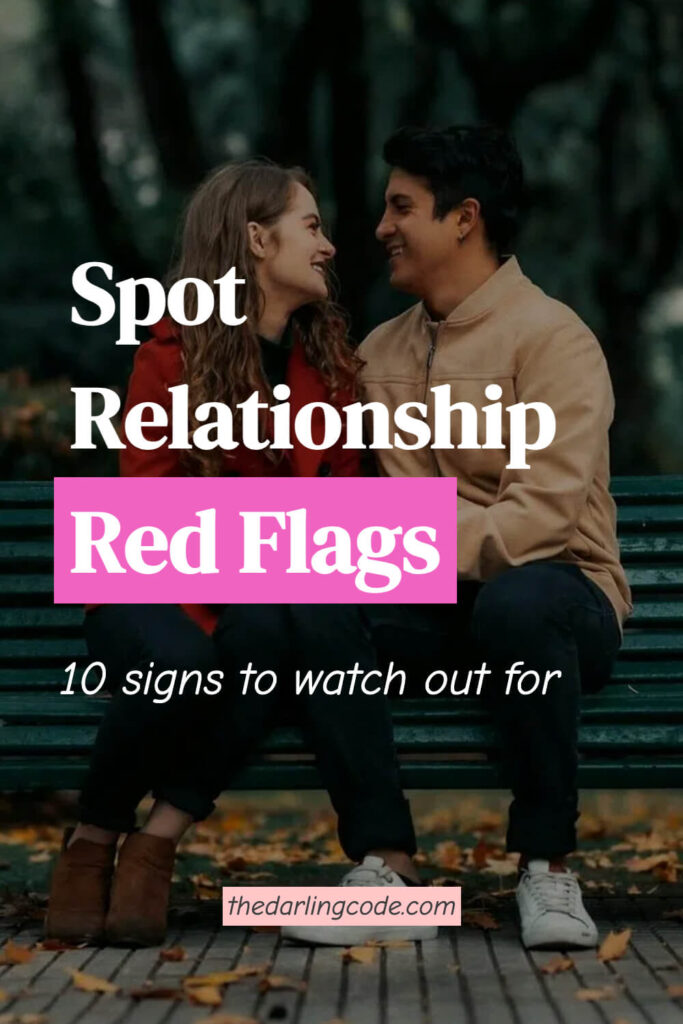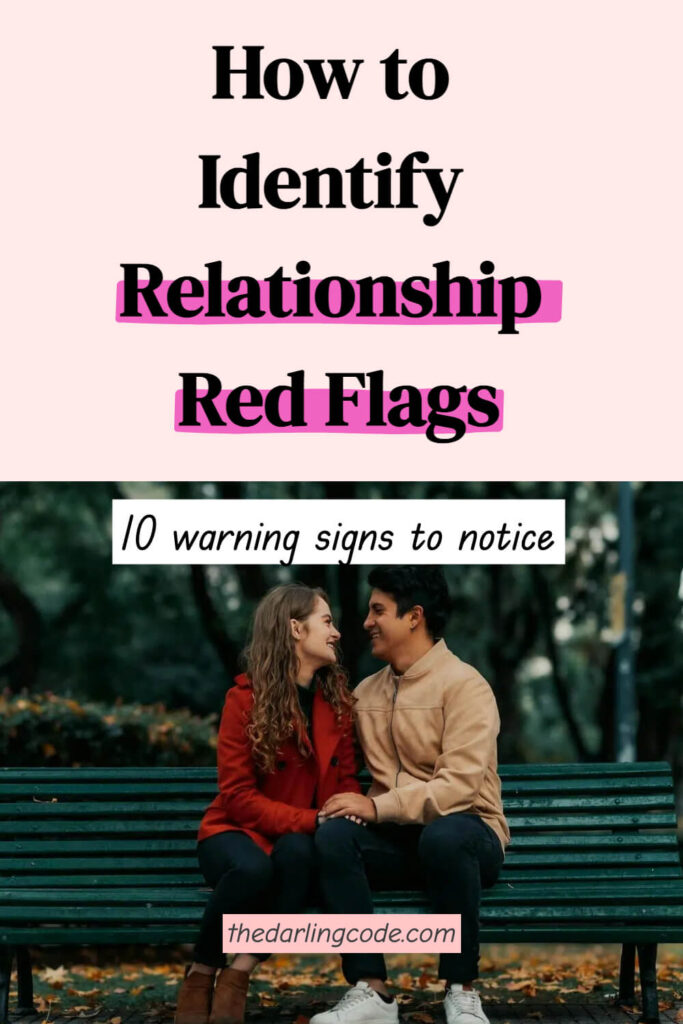10 Relationship Red Flags You Should Never Ignore (And How to Respond)
The experiences shared in this article are based on real emotional journeys, but all personal details are anonymized and used with the explicit written permission of the clients. Any resemblance to actual persons, living or dead, is purely coincidental. We are committed to treating all client stories with the utmost confidentiality and respect.
The Subtle Signs I Wish I’d Noticed Sooner
A client once described her ex as “perfect, except when he wasn’t.” He’d cancel plans last minute, mock her career goals as “cute,” and accuse her of flirting with baristas.
“But he always apologized with flowers,” she insisted.
It wasn’t until he showed up unannounced at her office to “check on her” that she realized: Love shouldn’t feel like a rollercoaster you’re desperate to escape.
Red flags aren’t always dramatic.
They’re often quiet, disguised as “quirks” or “passion.”
Through coaching hundreds of clients (and learning from my own past blind spots), I’ve identified 10 subtle signs that demand your attention—and the courage to act.
Save this article for later—Pin it to Pinterest and come back when you need it! 📌

1. They Dismiss Your Feelings as “Overreacting”
The Pattern:
- “You’re too sensitive.”
- “I was just joking—why can’t you take a joke?”
- Rolling their eyes when you express hurt.
Why It’s Toxic: Invalidating emotions erodes self-trust. Over time, you’ll second-guess your instincts.
Example: My client Jake told his partner that her sarcastic comments about his weight hurt him. She laughed: “Relax, it’s not that deep.”
He stopped bringing up issues altogether.
What to Do:
- Calmly say: “I need you to hear me, not fix me.”
- If they deflect, note how often it happens. Patterns matter more than apologies.
2. They Isolate You (Even “Nicely”)
The Red Flags:
- “Your friends don’t get us like I do.”
- Guilt-tripping when you make plans without them.
- Subtly criticizing loved ones: “Sarah seems kinda jealous of you, huh?”
Why It’s Toxic: Healthy partners encourage your connections. Isolation breeds dependency.
Example: A client’s boyfriend “joked” that her sister was a bad influence. Over time, she stopped attending family gatherings to avoid his judgment.
What to Do:
- Reclaim your time: “I’m having lunch with Maya on Saturday. Let’s plan something after!”
- If they resist, ask: “Why does my spending time with others bother you?”
3. Their Anger Feels Unpredictable
The Signs:
- Slamming doors over minor issues (e.g., burnt toast).
- “Silent treatments” lasting days.
- Blaming you for their outbursts: “You made me do this.”
Why It’s Toxic: Fear-based relationships keep you walking on eggshells.
Example: A client’s partner would scream during arguments, then buy her gifts to “make up.” She normalized it until he punched a wall near her head.
What to Do:
- Set a boundary: “I can’t talk when you’re yelling. Let’s revisit this when we’re calm.”
- Leave immediately if violence occurs. Call a trusted friend or hotline.
4. They Weaponize “Honesty”
The Mask: “I’m just being honest!”
The Reality: Cruelty disguised as truth.
Examples:
- “No one else would put up with your anxiety.”
- “You’re lucky I’m with you—your dating apps were dry.”
Why It’s Toxic: Erodes self-esteem to keep you compliant.
What to Do:
- Respond firmly: “Honesty without kindness is just aggression.”
- Refuse to engage: “I won’t discuss this if you’re being hurtful.”
5. They Keep You a Secret
The Red Flags:
- No photos together on social media after 6+ months.
- Avoiding introductions to friends/family.
- “I’m private, not ashamed!” (But posts other parts of their life.)
Why It’s Toxic: Suggests they’re hiding something—or keeping options open.
Example: A client dated a man for 8 months who never invited her to his apartment. Turns out, he was married.
What to Do:
- Ask directly: “Where do you see this going? I need clarity.”
- Walk away if they dodge commitment. You deserve transparency.
6. They “Forget” Promises Consistently
The Pattern:
- Canceling plans last minute.
- “Forgetting” your birthday, anniversary, or important conversations.
- “I’ll change, I swear!” → No follow-through.
Why It’s Toxic: Shows disrespect for your time and needs.
What to Do:
- Stop excusing them: “This keeps happening. What’s your plan to fix it?”
- If they blame “stress” or “busyness,” note: Everyone prioritizes what matters to them.
7. They Monitor or Control Your Appearance
The Red Flags:
- “Are you really wearing that?”
- Commenting on your weight, makeup, or clothing choices.
- Forcing “compromises”: “I’ll take you to dinner if you ditch the red lipstick.”
Why It’s Toxic: Attempts to mold you into their fantasy, not love who you are.
Example: A client’s girlfriend demanded she cut her hair short, saying long hair was “trashy.” She later admitted it was to lower her confidence.
What to Do:
- Reclaim autonomy: “My body, my choices.”
- If they push back, ask: “Why is this so important to you?”
8. They’re Always the Victim
The Pattern:
- Blaming exes, bosses, or friends for all their problems.
- Refusing accountability: “I cheated because you were cold.”
- Guilt-tripping: “After all I’ve done for you…”
Why It’s Toxic: You’ll become their therapist, not partner.
What to Do:
- Set limits: “I’ll support you, but I can’t fix this for you.”
- Suggest therapy—if they refuse, reconsider the relationship.
9. They Cross Sexual Boundaries
The Red Flags:
- Pressuring you into acts you’ve said no to.
- Dismissing your discomfort: “You liked it last time.”
- Using sex as a bargaining chip: “If you loved me, you’d…”
Why It’s Toxic: Coercion is abuse, not love.
What to Do:
- Leave immediately if you feel unsafe.
- Confide in a trusted person or contact RAINN (National Sexual Assault Hotline).
10. You Feel Lonelier With Them Than Without
The Sign:
- Dreading their texts/calls.
- Hiding parts of yourself to avoid judgment.
- Fantasizing about “what if” they changed.
Why It’s Toxic: Love should energize, not drain.
What to Do:
- Journal: “What would I tell my best friend in this situation?”
- Seek therapy to rebuild self-trust.
Final Words from The Darling Code
Red flags aren’t failures—they’re data.
This week, practice noticing one behavior that makes your stomach clench.
Name it. Share it with a friend.
And remember: Walking away isn’t defeat. It’s the bravest act of self-love.
You deserve a relationship where “compromise” doesn’t mean shrinking, “passion” isn’t chaos, and “love” feels like coming home—to yourself, and to someone who sees your worth.
With heart,
The Darling Code
P.S. Save this to your “Self-Respect Toolkit” Pinterest board! Today’s action step: Text a friend one boundary you’re committing to uphold. (“I’m done excusing last-minute cancellations. Proud of me?”) 🔥
Got value from this article? Pin it to Pinterest for easy reference and help others discover it! 🌟


ABOUT THE AUTHOR
Vivienne, Relationship Coach & Self Love Coach
Vivienne is a Relationship Coach and Self-Love Coach who believes the key to great relationships starts with YOU. She helps individuals and couples build confidence, set healthy boundaries, and create connections that truly honor who they are.






